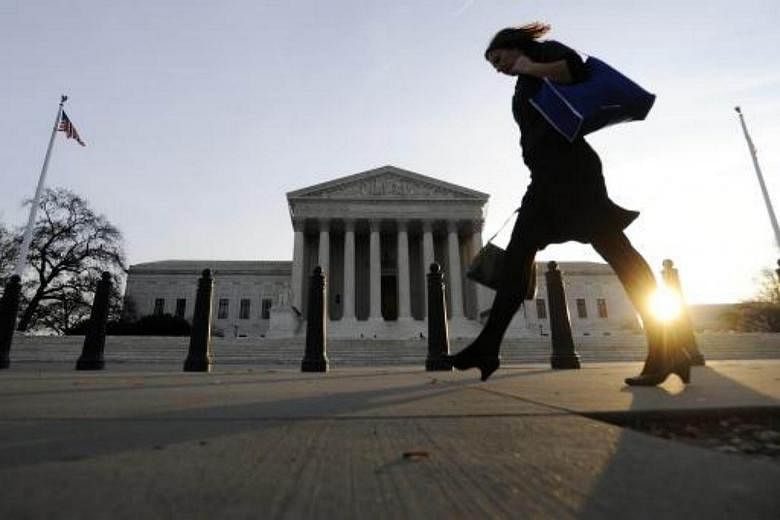WASHINGTON (AFP) - President Donald Trump's efforts to tighten the screws on immigration suffered a blow Thursday, when the Supreme Court set more restrictions on the government's ability to strip naturalised Americans of US citizenship.
In a unanimous 9-0 vote, the justices said a naturalized American citizen can only be stripped of the status for lying to the government if the false statements would have led officials to deny his or her original entry into the country as an immigrant.
The decision - which could have wide-ranging repercussions for millions of immigrants, refugees and naturalized citizens - came in a case concerning a Bosnian Serb couple who didn't disclose details about the husband's wartime past.
Divna Maslenjak broke American law when she failed to tell US embassy staff that her husband was in the Bosnian Serb army during the 1992-1995 Bosnian war when she applied for US asylum for her family, which they received in 1999.
As a result, government lawyers argued that the US citizenship Maslenjak obtained eight years later was void. She and her family were deported to Serbia in October.
But the Supreme Court justices questioned whether omissions seen to be lies were in themselves enough to forfeit American citizenship.
"The government must establish that an illegal act by the defendant played some role in her acquisition of citizenship," Justice Elena Kagan wrote in the majority opinion.
"When the illegal act is a false statement, that means demonstrating that the defendant lied about facts that would have mattered to an immigration official, because they would have justified denying naturalization or would predictably have led to other facts warranting that result." Every year, 780,000 people become Americans by choice, through a process requiring them to be of "good moral character." They must mention any criminal record or past offenses, even minor ones.
If someone is later deemed to have lied, the US Citizenship and Immigration Services, part of the Homeland Security Department, says their "citizenship may be taken away." The justices expressed alarm at the consequences of letting the government revoke citizenship on the basis of even minor or irrelevant lies.
"Suppose, for reasons of embarrassment or what-have-you, a person concealed her membership in an online support group or failed to disclose a prior speeding violation," wrote Kagan.
Allowing the government to revoke citizenship on that "meager" basis "would give prosecutors nearly limitless leverage - and afford newly naturalized Americans precious little security." .
'Material' lie?
Kagan was joined in her majority opinion by five other justices.
Neil Gorsuch, the justice appointed by Trump who joined the court in April, concurred in a separate opinion while also arguing that the court's majority had gone too far. He was joined by Justice Clarence Thomas.
Justice Samuel Alito penned a separate concurring opinion in which he argued for a lower standard, saying the law already "does not require proof that a false statement actually had some effect on the naturalization decision."
During oral arguments in April, Justice Anthony Kennedy told a government lawyer: "It seems to me that your argument is demeaning the priceless value of citizenship." The government lawyer, Robert Parker, replied that naturalisation was "the highest privilege the United States can bestow upon an individual."
Laws passed by Congress, he said, "required that individuals who seek that high privilege must scrupulously comply with every rule governing the naturalization process."
In the case of Divna Maslenjak, her husband was in the Bosnian Serb army when it was linked to the worst atrocity during the Bosnian war: the 1995 massacre in Srebrenica of 8,000 men and boys.
But when applying for asylum, she told the US embassy in Serbia that Ratko Maslenjak had stayed out of the army between 1992 and 1997 and feared reprisals for that.
When the untruth was discovered by US authorities, she did not deny it, but argued it had no bearing on her refugee application, based on the fact that her family lived in a Muslim-majority area where they risked persecution from Bosnian Muslims.

